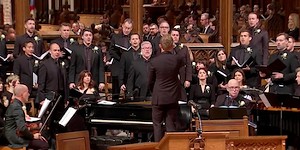This Is Who We Are #3: A New Year's Conspirare Classic
A daily affirmation of Austin's creativity from the Chronicle archive
By Robert Faires, 10:00AM, Wed. May 6, 2020
Our ability to experience art in person and with others is presently in lockdown, and we don't know when it will return, if ever. Local artists are already adapting to this situation – many sharing art online – which speaks to Austin's driving spirit of creativity. In tribute to that spirit, this series recalls past works that affirm our creative force.
This is who we are.

From Jan. 15, 2010:
A New Year's Conspirare Classic
St. Martin's Lutheran ChurchJan. 8
Whenever we cross into a new year, we tend to focus on 12-month spans: the one just behind us, the one right ahead. But as I listened to Conspirare's first concert of the new year, I found myself being nudged beyond those immediate turnings of the calendar toward something broader, something grander.
It began the moment the 42 voices of the chorus launched into song: Max Reger's "Der Mensch lebt und bestehet eine kleine Zeit" takes the measure of a man's lifetime and finds it meager beside that of the Almighty. Within that sobering comparison lay the vastness of eternity, the awe-inspiring nature of it underscored by the reverence of Conspirare's delivery. And as the ensemble worked its way through four more of the composer's Acht Geistliche Gesänge (Eight Spiritual Songs), the singers built on our sense of this Being of boundless power and majesty, their hushed wonder at the sacrifice upon the cross occasionally swelling with passion as they smoothly ascended the scales. Reger's 20th century evocation of Bach then gave way to the real thing: Johann Sebastian's "Singet dem Herrn ein neues Lied," a jubilant call for praising God that got the entire choir worked up in a way that I don't recall seeing before. From one end of the ensemble to the other, shoulders were rising and falling and black folders bobbing up and down. The music's joyousness had everyone bouncing as if on springs.
When the songs weren't invoking the Creator, they were invoking his creation and in ways that accentuated its monumental scope. Robert Schumann's "An die Sterne" addressed itself to the "stars in heaven's distant realm," and you could feel their far remove through the singers' voices pitched ethereally high and clustered so tightly as to strike the ears like ringing crystal. The only work of the evening not by a German composer, Samuel Barber's "Sure on This Shining Night," also looked toward those bright wanderers through the infinite, illuminating an Earth where, as James Agee's text has it, "all is healed, all is health." The song's image of a planet at peace, set with that elegiac tenderness so characteristic of Barber, was caressed by the company of voices in a manner that pierced the heart. Schumann's "Zigeunerleben," vividly describing night in a gypsy camp, and the pieces from Brahms' "Liebeslieder Waltzes," dancing through the various joys and sorrows of love, limned the earthly realm in copious detail – blazing fires, rushing streams, trembling bushes, malicious lime-twigs – which Conspirare attacked with a cheery gusto.
In all the evening, however, there was no greater sense of expansiveness, of opening up to the fullness of creation, than in the "Deutsche Motette," by Richard Strauss. It is built into the work, in the narrator's appeal to the sun and stars to awaken him and in the vocal parts, which divide and divide and divide again, into nearly two dozen parts of dizzying range and staggering complexity. As the choir performed the motet, individual voices would break out of the choral whole like single dreamers rising from the common bed of night, all with the same cry but expressed in beautifully varied ways. The solo voices soared and dipped and wove in and around one another with astounding elegance and then fused together again, as if all those separate dreamers had recognized their shared entreaty and joined hands. It is part of the wonder of Conspirare that it can take works which are so formidable, so exacting, and render them with such grace that their difficulty isn't apparent. With the Strauss, what you were aware of was not how hard the singers were working but how sumptuous and gorgeous and heavenly were their sounds, how they expanded your senses, put you in touch with earth and sky and stars.
Opening us up, connecting us to the greater world – that's what Artistic Director Craig Hella Johnson and Conspirare do and do so well. And they did it here, just as the program's title promised, in "classic" fashion. When I stepped out of St. Martin's Church into a shining night of the new year, the calendar had fallen away, and I was feeling the timeless benediction of the stars and listening to the music of the spheres.
A note to readers: Bold and uncensored, The Austin Chronicle has been Austin’s independent news source for over 40 years, expressing the community’s political and environmental concerns and supporting its active cultural scene. Now more than ever, we need your support to continue supplying Austin with independent, free press. If real news is important to you, please consider making a donation of $5, $10 or whatever you can afford, to help keep our journalism on stands.
Robert Faires, Oct. 26, 2018
Robert Faires, Feb. 10, 2015
Sept. 24, 2021
Sept. 17, 2021
Conspirare, Craig Hella Johnson









